Shit No Go, We No Go!
 It has been three days now. For three days we are huddled with seven people in the last of two tents we still have up. Two of us sleep on the kitchen table, the rest of either in a chair or on pieces of luggage which we stacked in the corner of what once was our kitchen tent. The other tent is full with our personal gear. All the rest of our equipment is crated and lined up near the helicopter landing site.
It has been three days now. For three days we are huddled with seven people in the last of two tents we still have up. Two of us sleep on the kitchen table, the rest of either in a chair or on pieces of luggage which we stacked in the corner of what once was our kitchen tent. The other tent is full with our personal gear. All the rest of our equipment is crated and lined up near the helicopter landing site.When the Akademik Fedorov, our Russian pick-up vessel (the largest in the Antarctic by the way!) arrived at the island three days ago, the sky was covered. After they landed their big Mil-8 helicopter near our expedition camp, we loaded it up as much as we could, but the mist came in from above the sea and in minutes. The visibility turned real bad. So bad that the pilot had to fly on radar trying to find the ship back. The evacuation was aborted then. Three days we are now waiting to get off the Antarctic. On the ship, a few miles off shore, hot showers and proper meals are waiting for us. But it could just as well have been thousands of miles away, so un-obtainable it seems to us.
 And each day we wake up, we hope for the fog to clear up, but it does not. Luckily it does not storm anymore. For weeks on end, we have been fighting against the storm, the snow, the cold, and now, everything seems quiet outside. Dead quiet. Since we landed here, the only sign of life we have seen is a few birds which seem to nest at the bottom of the glacier, hundreds of meters below our camp. The only connection to the ‘other side’ of the world, the ship, we have, is our radio.
And each day we wake up, we hope for the fog to clear up, but it does not. Luckily it does not storm anymore. For weeks on end, we have been fighting against the storm, the snow, the cold, and now, everything seems quiet outside. Dead quiet. Since we landed here, the only sign of life we have seen is a few birds which seem to nest at the bottom of the glacier, hundreds of meters below our camp. The only connection to the ‘other side’ of the world, the ship, we have, is our radio.Willy’s voice comes crackling through the speaker. “Peter I, this is Fedorov, over”. Ralph takes the microphone, and answers the call. “Sorry, still no chance for helicopter flights”, says Willy.. Martin and him are the only two from our crew of nine who got onto the one and only flight we
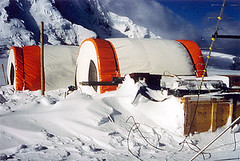 had to the ship. Three days ago. Three days. We are bored. After the excitement of landing on the island, building up the camp, setting up the radio stations, and in two weeks, breaking the world record – we made 62,000 radio contacts from this island, 10,000 more than the previous record- and the excitement of the first sight of the Fedorov, our pickup vessel, we have nothing to do anymore, but to wait. Wait for the weather to clear up. Reading a bit, making coffee, eating some of our survival rations, sleeping, reading, eating,… We can not do much else. But to look at the grey sky of course.
had to the ship. Three days ago. Three days. We are bored. After the excitement of landing on the island, building up the camp, setting up the radio stations, and in two weeks, breaking the world record – we made 62,000 radio contacts from this island, 10,000 more than the previous record- and the excitement of the first sight of the Fedorov, our pickup vessel, we have nothing to do anymore, but to wait. Wait for the weather to clear up. Reading a bit, making coffee, eating some of our survival rations, sleeping, reading, eating,… We can not do much else. But to look at the grey sky of course.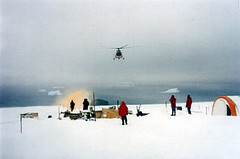 In the afternoon, as by miracle, we start to see a faint sun through the clouds. The cloud cover becomes patchy. Would there be a chance? Willy calls us on the radio saying they will give it a go. As if we were bitten by a snake, everyone jumps up, and gets dressed. Indeed the clouds are breaking up. At times we can even see the sea. Somewhere the ship is there.
In the afternoon, as by miracle, we start to see a faint sun through the clouds. The cloud cover becomes patchy. Would there be a chance? Willy calls us on the radio saying they will give it a go. As if we were bitten by a snake, everyone jumps up, and gets dressed. Indeed the clouds are breaking up. At times we can even see the sea. Somewhere the ship is there.Half an hour later, we hear the roaring noise from the big helicopter. We fire up a smoke signal, and turning the low hanging clouds into orange. The pilot spots the signal and very slowly descends, touching down onto the snow. As by magic, the clouds disappear. While the pilot keeps the turbine generators running, the back doors open up, and the heli crew jumps out. They make signs we have to hurry. We drag boxes, crates, bags towards the helicopter, and stuff as much gear as we can into the haul. Half an hour later, they lift off.
We take a break, hoping the weather stays clear. And it does. In no time, the gray-orange helicopter hovers above our camp again, approaching our landing site. Again we drag all we can,
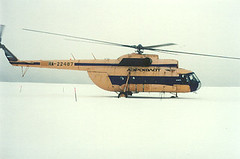 as fast as we can to the helicopter. Some stuff is too heavy to carry, so we drag it over the snow, pushing and pulling with all the weight we have, with all the force we can handle. If we don’t make use of this break in the weather, god knows when the next opening would come.
as fast as we can to the helicopter. Some stuff is too heavy to carry, so we drag it over the snow, pushing and pulling with all the weight we have, with all the force we can handle. If we don’t make use of this break in the weather, god knows when the next opening would come.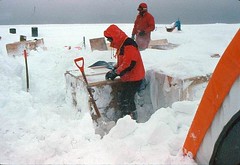 And we have plenty of gear. Tons of it. Masts, tents, antennas, boxes of radio equipment, personal stuff, left-over food rations, heaters, fuel barrels, gas bottles, generators, tools. All of it is carried, dragged, to the helicopter.
And we have plenty of gear. Tons of it. Masts, tents, antennas, boxes of radio equipment, personal stuff, left-over food rations, heaters, fuel barrels, gas bottles, generators, tools. All of it is carried, dragged, to the helicopter.Three hours and several flights later, there is nothing left, but two tents and a survival kit. Now is the critical moment. If we take down our last two tents, we have no more shelter. If a storm comes up, we will have real difficulties to set it up in the wind. Would almost be impossible to put
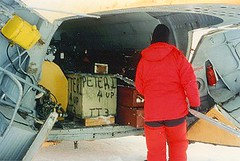 the huge heavy-insulated covers over the metal frames. Ralph, our expedition leader, looks at the sky. “Let’s do it. Let’s break it up”, he shouts. Like animals we ‘attack’ the shelters. In no time, the covers, frames, wooden floors are all dismantled and stacked up, bagged and tied.
the huge heavy-insulated covers over the metal frames. Ralph, our expedition leader, looks at the sky. “Let’s do it. Let’s break it up”, he shouts. Like animals we ‘attack’ the shelters. In no time, the covers, frames, wooden floors are all dismantled and stacked up, bagged and tied.The last helicopter flight comes in. We stack all material in it. The last things to go are the white trash bags, with our human waste. We promised the Norwegian authorities who gave us the landing permit for this isolated island, we would take everything off. And everything has to go. Even the human waste. The pilot looks at the bags we carry. He opens one of them and looks inside.. With a disgusted face, he says “Njet”, making signs as if we are crazy. We start a discussion. In the end, I shout, trying to lift my voice above the noise of the engine turbines, in my most simple English: “Shit no go, we no go!”.. The pilot smiles, and gives in. We dump the bags of frozen waste into the helicopter, and get on board. The engines rev up and the huge propellers start turning, chopping into the air. With a deafening sound, the huge thing lifts up, and before we know it, we hover several meters above the ground.
Through the small windows, we gaze at our camp site below. There is nothing left to witness our presence on the island. Nothing but our footprints and two square imprints of where our last two shelters stood, soon to be wiped away with the fresh snow. Soon our presence will be covered, erased from this island’s memory.
Is this symbolic to our presence in the world? Is all of it just temporarily setting our footprints on the earth’s surface, and the moment we go, the moment we leave this existence, those prints are wiped away, to be forgotten? We come, think we can conquer it all, but still, all is temporarily… As I look at the pensive faces of my companions, I smile… At least on this ride, we also took our shit with us! Hopefully they will not ask that from us when we go to heaven. And if so, would St.Peter at heaven’s gate have the same look on his face as the pilot? And would we answer the same to him too: “Shit no go, we no go?”
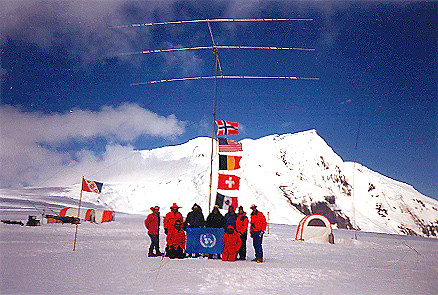
Continue reading The Road to the Horizon's Ebook, jump to the Reader's Digest of The Road.
 Peter. Flemish, European, aid worker, expeditioner, sailor, traveller, husband, father, friend, nutcase. Not necessarily in that order.
Peter. Flemish, European, aid worker, expeditioner, sailor, traveller, husband, father, friend, nutcase. Not necessarily in that order.
0 comments:
Post a Comment